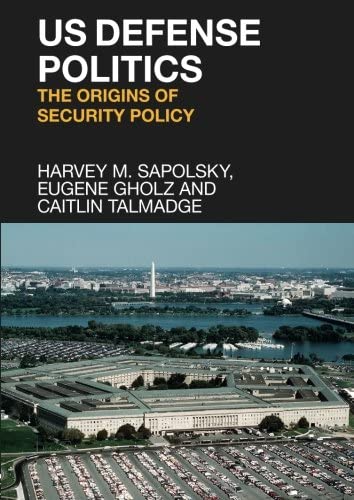
| Judul | US Defense Politics : The Origins of Security Policy / Harvey M. Sapolsky, Eugene Gholz and Caitlin Talmadge |
| Pengarang | Sapolsky, Harvey M Eugene Gholz Caitlin Talmadge |
| Penerbitan | New York : Routledge, 2009 |
| Deskripsi Fisik | xiv, 191 p. :: illus. ;25 cm. |
| ISBN | 978-0-415-77266-2 |
| Subjek | National security - United States Civil-military relations - United States |
| Abstrak | This book seeks to explain how US defense and national security policy is formulated and conducted. The focus is on the role of the President, Congress, political partisans, defense industries, lobbies, science, the media, and interest groups, including the military itself, in shaping policies. It examines the following key themes: US grand strategy; who joins America's military; how and why weapons are bought; the management of defense; public attitudes toward the military and casualties; the roles of the President and the Congress in controlling the military; the effects of 9/11 on security policy, homeland security, government reorganizations. The book shows how political and organizational interests determine US defense policy, and warns against the introduction of centralising reforms. |
| Catatan | Indeks : p.186-191 |
| Bahasa | Inggris |
| Bentuk Karya | Tidak ada kode yang sesuai |
| Target Pembaca | Tidak ada kode yang sesuai |
| Tag | Ind1 | Ind2 | Isi |
| 001 | INLIS000000000004992 | ||
| 005 | 20221109034546 | ||
| 008 | 221109################|##########|#eng## | ||
| 020 | # | # | $a 978-0-415-77266-2 |
| 035 | # | # | $a 0010-0520004992 |
| 041 | $a eng | ||
| 082 | # | # | $a 355.033 |
| 084 | # | # | $a 355.033 SAP u |
| 100 | 0 | # | $a Sapolsky, Harvey M |
| 245 | 1 | # | $a US Defense Politics : $b The Origins of Security Policy /$c Harvey M. Sapolsky, Eugene Gholz and Caitlin Talmadge |
| 260 | # | # | $a New York :$b Routledge,$c 2009 |
| 300 | # | # | $a xiv, 191 p. : $b : illus. ; $c 25 cm. |
| 500 | # | # | $a Indeks : p.186-191 |
| 520 | # | # | $a This book seeks to explain how US defense and national security policy is formulated and conducted. The focus is on the role of the President, Congress, political partisans, defense industries, lobbies, science, the media, and interest groups, including the military itself, in shaping policies. It examines the following key themes: US grand strategy; who joins America's military; how and why weapons are bought; the management of defense; public attitudes toward the military and casualties; the roles of the President and the Congress in controlling the military; the effects of 9/11 on security policy, homeland security, government reorganizations. The book shows how political and organizational interests determine US defense policy, and warns against the introduction of centralising reforms. |
| 650 | 4 | $a Civil-military relations - United States | |
| 650 | 4 | $a National security - United States | |
| 700 | 0 | # | $a Caitlin Talmadge |
| 700 | 0 | # | $a Eugene Gholz |
| 990 | # | # | $a 13281/MKRI-P/XI-2009 |
| 990 | # | # | $a 13281/MKRI-P/XI-2009 |
| 990 | # | # | $a 13281/MKRI-P/XI-2009 |
| 990 | # | # | $a 13282/MKRI-P/XI-2009 |
| 990 | # | # | $a 13282/MKRI-P/XI-2009 |
| 990 | # | # | $a 13282/MKRI-P/XI-2009 |
Content Unduh katalog